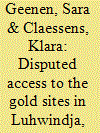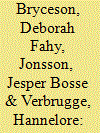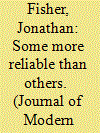|
|
|
Sort Order |
|
|
|
Items / Page
|
|
|
|
|
|
|
| Srl | Item |
| 1 |
ID:
120916


|
|
|
|
|
| Publication |
2013.
|
| Summary/Abstract |
In a context of increased competition over natural resources, large-scale investors are showing renewed interest in eastern Congo's mineral resources. At the local level this is resulting in fierce disputes over access to land and to mining sites. This article offers an empirical study of access in Luhwindja, where a multinational mining company has recently begun to exploit gold. We first sketch the context, examining the overlapping legal fields and analysing how various actors gain and control access to the gold mines. Next we study how the arrival of Banro Corporation in Luhwindja has altered power relations at the local level. Looking more specifically at the displacement of artisanal miners and the resettlement of local communities, we demonstrate how the company, local elites and the local population have engaged in a complex struggle for access.
|
|
|
|
|
|
|
|
|
|
|
|
|
|
|
|
| 2 |
ID:
120918


|
|
|
|
|
| Publication |
2013.
|
| Summary/Abstract |
This article analyses contemporary Eritrea's acute crisis within the framework of the theory of anomie. It is based on the hypothesis that militarisation, forced labour, mass exodus and family disintegration can be interpreted as the consequences of two incompatible norm and value systems: the collectivist, nationalistic and militaristic worldview of the former liberation front and ruling party People's Front for Democracy and Justice (PFDJ), and the traditional cultural system of Eritrea's society. In 2002 the regime introduced an unlimited 'development campaign', thereby forcing large parts of the society to live as conscripts and perform unpaid labour. This has caused a mass exodus of young people and a rapid process of family disintegration. The article is based on empirical fieldwork and evaluates the ongoing developments which have led to rapid economic decline and the destabilisation of the entire fabric of society.
|
|
|
|
|
|
|
|
|
|
|
|
|
|
|
|
| 3 |
ID:
120917


|
|
|
|
|
| Publication |
2013.
|
| Summary/Abstract |
This article critically reflects on what impact a supported and formalized artisanal and small-scale mining (ASM) sector could have in Northern Ghana, where poverty is deeply rooted, the outcome of decades of government neglect. Since independence in 1957, numerous attempts have been made to improve the living standards of the populations in the country's North but deteriorated human resource bases and shortages of infrastructure have limited their effectiveness. A recent upsurge in ASM activity, however, has catapulted the region on to another - previously unimaginable - growth trajectory entirely. As findings from research carried out in the township of Kui in Bole District of the country's Northern Region illustrate, ASM has injected considerable wealth into many of Ghana's Northern localities, in the process helping to stabilise their economies and alleviate the hardships of tens of thousands of farm-dependent families. The intensification of support to, and the formalisation of, ASM, could prove to be an important step toward eradicating a poverty problem that has plagued this region of sub-Saharan Africa for more than a century.
|
|
|
|
|
|
|
|
|
|
|
|
|
|
|
|
| 4 |
ID:
120914


|
|
|
|
|
| Publication |
2013.
|
| Summary/Abstract |
Tanzania, along with several other African countries, is experiencing a national mining boom, which has prompted hundreds of thousands of men and women to migrate to mineral-rich locations. At these sites, relationships between the sexes defy the sexual norms of the surrounding countryside to embrace new relational amalgams of polygamy, monogamy and promiscuity. This article challenges the assumption that female prostitution is widespread. Using interview data with women migrants, we delineate six 'wifestyles', namely sexual-cum-conjugal relationships between men and women that vary in their degree of sexual and material commitment. In contrast to bridewealth payments, which involved elders formalising marriages through negotiations over reproductive access to women, sexual negotiations and relations in mining settlements involve men and women making liaisons and co-habitation arrangements directly between each other without third-party intervention. Economic interdependence may evolve thereafter with the possibility of women, as well as men, offering material support to their sex partners.
|
|
|
|
|
|
|
|
|
|
|
|
|
|
|
|
| 5 |
ID:
120913


|
|
|
|
|
| Publication |
2013.
|
| Summary/Abstract |
This article explores the role of perceptions in donor-African relations and the extent to which donor 'images' of African governments can be managed by these same governments to their advantage. The article focuses on donor views of 'reliability' in the Global War on Terror (GWOT) and compares differing international perceptions of Kenya and Uganda through this lens. Arguing that donors have an exaggerated sense of Ugandan 'compliance' or reliability and Kenyan unreliability in fighting terrorism, it explains this by examining the two governments' international 'image management' strategies, or lack thereof. The analysis contends that Uganda's success at promoting itself as a major donor ally in the GWOT, compared with Kenya's general reluctance to do the same, has played a significant role in building and bolstering these differing donor perceptions. This, the article suggests, raises important questions about the nature of African agency in the international system.
|
|
|
|
|
|
|
|
|
|
|
|
|
|
|
|
| 6 |
ID:
120915


|
|
|
|
|
| Publication |
2013.
|
| Summary/Abstract |
Community forest management is often advanced as a remedy for failing top-down approaches to nature conservation. Contingent on the property rights theory, it assumes that local participation in natural resource management results in sustainable structures. There is, however, insufficient empirical evidence on the intra-community dynamics - especially when households have unequal access to the local institutions managing the natural resource. This paper looks at the socio-cultural, economic and institutional situation of households with and without access to management institutions in communities around the Kilum-Ijim Mountain Forest in Cameroon and analyses whether livelihood differences are associated with variations in management patterns. The analysis reveals differences by household type and a mixed picture of the evolution of species in the community forests over time, questioning the role of the community in natural resource conservation. Furthermore, the paper discusses the potentials of wildlife domestication for livelihoods and conservation in forest communities. The results are important in the light of ongoing conservation efforts in natural resource hot-spots in sub-Saharan Africa.
|
|
|
|
|
|
|
|
|
|
|
|
|
|
|
|
|
|
|
|
|